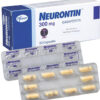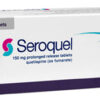Medication Overview
Seroquel, generically known as quetiapine, is an antipsychotic medication used to manage certain mental health disorders. It belongs to the class of atypical antipsychotics, which aim to treat the symptoms of schizophrenia, bipolar disorder, and, in some cases, major depressive disorder. Seroquel is available in immediate-release and extended-release forms, allowing for flexibility in dosing depending on the patient’s needs.
Mechanism of Action
Seroquel works by modulating the activity of neurotransmitters in the brain, predominantly dopamine and serotonin. Its antipsychotic effects are mainly due to its antagonistic action on serotonin 5-HT2A and dopamine D2 receptors. By balancing these neurotransmitter pathways, Seroquel helps reduce symptoms such as hallucinations, delusions, and mood swings. Additionally, Seroquel exhibits some affinity for histamine and adrenergic receptors which can contribute to its sedative properties.
Indications for Use
Seroquel is primarily prescribed for the treatment of schizophrenia, where it addresses both positive and negative symptoms. It is also utilized in managing bipolar disorder, helping in both manic and depressive episodes. In cases of major depressive disorder, Seroquel is often prescribed as an adjunctive therapy to enhance the effectiveness of primary antidepressant treatments. The choice to prescribe Seroquel is based on a thorough evaluation of the patient’s condition and response to other medications.
Dosage and Administration
The dosing of Seroquel varies significantly based on the indication and patient profile. For schizophrenia, the recommended starting dose is typically around 25 mg twice daily, with adjustments made over time. In the case of bipolar mania, initial dosing might be higher, depending on symptom severity. The extended-release form is usually administered once daily. It is crucial for the dose to be tailored to the individual for optimal therapeutic outcomes, minimizing potential side effects.
Interaction with Other Drugs
Seroquel can interact with a broad range of medications, necessitating careful monitoring and adjustment. Caution is advised when it is taken alongside drugs that also influence the central nervous system, such as antidepressants, antiepileptics, or sedatives, as they may amplify effects like sedation. Furthermore, medications that prolong the QT interval can interact with Seroquel, potentially leading to cardiac issues. Due attention should be given when Seroquel is combined with CYP3A4 inhibitors, as these can increase the levels of quetiapine in the bloodstream.
Pharmacokinetics
Seroquel is absorbed well after oral administration, with an average bioavailability of around 9%. The time to reach peak plasma concentration varies between the immediate and extended-release formulations. The drug is extensively metabolized in the liver, primarily through the cytochrome P450 3A4 pathway. The metabolites of Seroquel are excreted mainly via urine, with a smaller portion eliminated through feces. This pharmacokinetic profile necessitates consideration in patients with hepatic impairment.
Impact on Metabolic Function
Seroquel has been linked to metabolic changes, which require attentive monitoring throughout treatment. These effects can include alterations in blood lipid levels, glucose metabolism, and potential weight gain. It is often necessary to monitor patients for signs of hyperglycemia, dyslipidemia, and significant changes in body weight. Regular metabolic screenings can help mitigate long-term risks associated with these effects, guiding necessary lifestyle and medication adjustments.
Effects on Cognitive Function
The influence of Seroquel on cognitive function varies among individuals. While some experience improvements in symptoms like delusions, this medication may also contribute to sedation, leading to temporary cognitive dulling. In some cases, long-term use can affect concentration and alertness. It is important to assess cognitive functions regularly during therapy to ensure that benefits outweigh cognitive drawbacks. Adjustments to dosing or medication schedules may help manage these effects effectively.
Special Populations Considerations
In prescribing Seroquel, particular attention is given to special populations such as the elderly, children, and patients with comorbid medical conditions. In elderly patients, especially those with dementia-related conditions, an increased risk of adverse outcomes is considered. Pediatric usage requires evidence of clear benefit and is often restricted to certain age groups and conditions. In patients with cardiovascular issues, close monitoring is mandated due to potential effects on heart rhythm, and dose adjustments might be necessary for those with hepatic or renal impairment.
Withdrawal and Discontinuation
Discontinuing Seroquel should be managed carefully to avoid withdrawal symptoms, which can include insomnia, nausea, and return of psychotic symptoms. Tapering off slowly under medical guidance is advised, as abrupt cessation could lead to acute symptom resurgence. A well-structured discontinuation plan will enable clinicians to observe any re-emerging symptoms early and adjust treatment plans appropriately to maintain patient stability.
Storage and Stability
Proper storage of Seroquel is essential to maintain its stability and effectiveness. This medication should be kept in its original packaging, away from excess moisture and heat, at controlled room temperatures. Ensuring it is stored out of reach of children and not exposing it to light will preserve the integrity of the tablets. Any expired or unused medication should be disposed of properly as per the recommended guidelines to prevent accidental ingestion or misuse.








Reviews
There are no reviews yet.